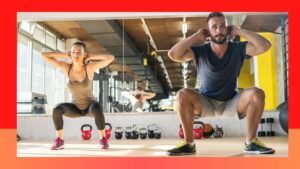Discover the truth about slow squats and their effectiveness in building leg strength. Read on to find out everything you need to know about this popular exercise technique.
Yes, slow squats can be effective in building strength and muscle mass. Slowing down the movement increases the time under tension, which can lead to greater muscle fiber recruitment and adaptation. Additionally, slow squats can help improve technique, range of motion, and joint stability. However, it’s important to vary your squatting routine and not rely solely on slow squats. Incorporating different squat variations and training methods can help prevent plateaus and promote overall progress.
Slow squats can be effective in building strength and muscle mass.
Slow squats are a fantastic way to take your leg training to the next level. The increased time under tension that comes with slowing down the movement can really make a difference in building strength and muscle mass.
Not only that, but it can also help you perfect your form and technique, leading to better results in the long run.
And let’s not forget about the sense of accomplishment and satisfaction that comes with pushing your body to its limits and seeing the gains that result from hard work and dedication.
So if you’re ready to challenge yourself and take your leg day to the next level, give slow squats a try.

Slow squats can help improve technique, range of motion, and joint stability.
Slow squats truly are a game-changer. Not only do they help build strength and muscle mass, but they also improve your overall technique, range of motion, and joint stability.
It’s incredible how one simple tweak to your squatting routine can make such a huge impact on your overall performance.
However, it’s important to remember that variety is key. Don’t get stuck in a rut by relying solely on slow squats.
Mix things up by incorporating different squat variations and training methods to keep your body guessing and to promote overall progress. Keep pushing yourself and you’ll be amazed at the results you can achieve!
Incorporating different squat variations and training methods can also help
If you want to keep seeing progress and avoid hitting a plateau, it’s crucial to mix things up with different squat variations and training methods.
Don’t let yourself fall into a rut by doing the same old thing every time you hit the gym. Explore new ways to challenge yourself and keep your body guessing.
The feeling of pushing past a plateau and seeing the gains that come with it is truly unbeatable.
So get creative, stay motivated, and keep striving for progress. You’ve got this!
Final thought
Slow squats are highly effective, though It is a complex movement that involves several joint activities and supporting musculature, slow Squatting is a valuable exercise for increasing the lower body muscles’ strength, power, and endurance when it done correctly.
It put pain and strain on your foot/ankle, knees, and hips, those are prominent locations for incorrect movement patterns when executing the squat exercise.
Novice exercisers can avoid it needless and preventable injuries during exercise by being aware of these improper motions and correcting them.
Conclusion
In conclusion, slow squats can be an effective way to build leg strength and improve your overall fitness.
By slowing down the movement and focusing on proper form, you can engage more muscle fibers, reduce the risk of injury, and increase your flexibility.
While slow squats may not be for everyone, they can be a great addition to any workout routine for those looking to take their leg strength to the next level.
So, if you’ve been wondering “Are slow squats effective?” the answer is a resounding yes! Give them a try and see for yourself the amazing benefits they can offer.
Whether you’re a seasoned athlete or a beginner just starting out, slow squats can help you achieve your fitness goals and improve your overall health and well-being. So, what are you waiting for? Get squatting and start seeing results.
Q&A
Why do squats hurt knees?
As we all know, the primary purpose of Squat exercise is to strengthen the lower body’s muscle groups, specifically the thighs and glutes. The knee joint is positively affected by it, but this is only true when you practice it correctly.
Performing squats incorrectly is easy to put extra pressure on the knees, leading to pain in this part during exercise. Sometimes a knee dislocation can also be caused by this.
Can Squats Help You Lose Weight?
Absolutely, yes. The squat exercise is a high-intensity compound exercise that works a variety of muscles and burns a lot of calories; it will further aid in weight reduction if you use heavy weights.
Related article:
What Not To do when squatting? (7 Most important things NOTE)

Hey there, it’s Mike Rrsq, the Editor-in-Chief over at Jsquat.com, and I’m absolutely obsessed with all things squat fitness! I’ve been lucky enough to get some serious recognition for my work in this field. With a solid background in the fitness and wellness industry, I’ve been there right from the get-go, helping shape this website into what it is today.
You see, I’m not just the boss around here; I’m also a passionate contributor. I love sharing my insights through my articles, and trust me, they’re not your run-of-the-mill stuff. Each piece I write is a labor of love, filled with my expertise and real-world experience in the fitness universe. So, if you’re into fitness and looking for some inspiration, you’re in the right place!
